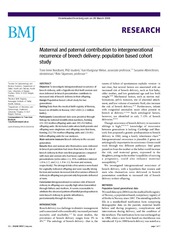Maternal and paternal contribution to intergenerational recurrence of breech delivery: population based cohort study
Peer reviewed, Journal article
Published version
Permanent lenke
https://hdl.handle.net/1956/3789Utgivelsesdato
2008-03-27Metadata
Vis full innførselSamlinger
Originalversjon
https://doi.org/10.1136/bmj.39505.436539.beSammendrag
Objective: To investigate intergenerational recurrence of breech delivery, with a hypothesis that both women and men delivered in breech presentation contribute to increased risk of breech delivery in their offspring. Design: Population based cohort study for two generations. Setting: Data from the medical birth registry of Norway, based on all births in Norway 1967-2004 (2.2 million births). Participants: Generational data were provided through linkage by national identification numbers, forming 451 393 mother-offspring units and 295 253 fatheroffspring units.We included units where both parents and offspring were singletons and offspring were first born, forming 232 704 mother-offspring units and 154 851 father-offspring units for our analyses. Main outcome measure: Breech delivery in the second generation. Results: Men and women who themselves were delivered in breech presentation had more than twice the risk of breech delivery in their own first pregnancies compared with men and women who had been cephalic presentations (odds ratios 2.2, 95% confidence interval 1.8 to 2.7, and 2.2, 1.9 to 2.5, for men and women, respectively). The strongest risks of recurrence were found for vaginally delivered offspring and were equally strong formenand women. Increased risk of recurrence of breech delivery in offspring was present only for parents delivered at term. Conclusion: Intergenerational recurrence risk of breech delivery in offspring was equally high when transmitted through fathers and mothers. It seems reasonable to attribute the observed pattern of familial predisposition to term breech delivery to genetic inheritance, predominantly through the fetus.
